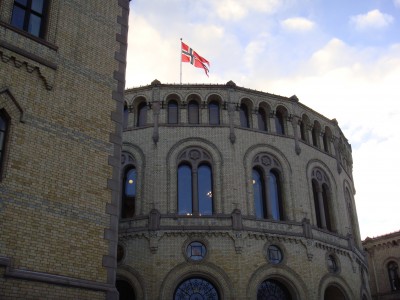An expanded meeting of the Norwegian Parliament’s foreign policy- and defense committee was set on Monday to discuss how Norway will respond to the EU- and US sanctions against Russia. Meanwhile, Russia’s own retaliatory boycott against food from countries including Norway may not hit Norwegian trade so hard after all.

Norwegian Foreign Minister Børge Brende was due to orient Members of Parliament on Monday about how the Norwegian government thinks the country should handle the sanctions against its neighbour in the north, along with the perceived effects of Russia’s response to them. Russian Prime Minister Dmitry Medvedev announced last week that Russia was immediately blocking all imports of fish, meat, poultry and dairy products from the EU, the US, Australia, Canada and Norway for the next year.
That means Norway can no longer sell its salmon and other seafood to Russia, which is one of its biggest single markets, prompting analysts to predict “quite dramatic” consequences for Norway’s important seafood industry.
Russia’s boycott may not bite
The industry and the state responded quickly, though, and by Friday had already authorized Norway’s seafood council to spend another NOK 50 million (USD 8.3 million) on marketing of Norwegian salmon internationally. The council will also quickly divert another NOK 9 million still left in its budget for marketing and promotion of Norwegian seafood in Russia to other countries.
“Its absolutely possible to sell a lot more Norwegian salmon to the US,” Christian Cramer of the seafood council told news bureau NTB over the weekend. Exports in July were already double those in the same month last year, because special US tariffs against Norwegian salmon were lifted. Cramer thinks sales of whole Norwegian salmon can increase much more, noting that “the US is already the world’s largest market for salmon.”
Seafood producers are also keen on selling much more to the EU, and marketing efforts will be boosted especially in Spain, Italy and Germany. In France, which currently imports the most Norwegian salmon, marketing budgets will be boosted from NOK 20 million to NOK 30 million.
Norway faces trade conflicts with the EU, though, over the former left-center government’s decision to hinder meat and cheese imports from European countries, in order to protect Norwegian meat and cheese producers. The conservative government that replaced the former left-center coalition last year had initially claimed it would remove the hindrances, in the form of high tariffs, but then backed down under political pressure. Now questions are rising over whether the controversial meat and cheese tariffs will finally give way to efforts to save seafood exports, in the wake of the Russian counter-sanctions.
Cross-border business booming
In Northern Norway, there were signs that trade with Russia might actually increase. Residents living within a 30-kilometer radius of the border crossing east of Kirkenes can travel freely over the Norwegian-Russian border, and newspaper Dagens Næringsliv (DN) reported on Monday that Russians were busy shopping at Kirkenes stores over the weekend, to stock up on products they no longer can get at home. Others have speculated that Russian consumers may actually be hit the hardest by their government’s boycott, if prices rise and selection declines at the market. Russia still, however, has other import sources from countries not affected by its boycott.
Norwegian politicians were expected to go along with the EU- and US sanctions against Russia, imposed because of the ongoing conflict over Russia’s military intervention in Ukraine. All the leaders of Norway’s political parties were due to attend Monday’s briefing of the foreign relations- and defense committee.
Key opposition leaders from the Labour Party already have indicated that they “in general” are inclined to react together with Norway’s allies. “It’s not automatic that Norway follows the EU, but it is natural,” the Labour Party’s Anniken Huitfeldt, who has always opposed EU membership for Norway, wrote in an email to newspaper Aftenposten. Huitfeldt serves as leader of the foreign relations committee in Parliament, which must decide whether to adhere to the sanctions that mostly affect the energy, weapons and finance sectors.
newsinenglish.no/Nina Berglund

